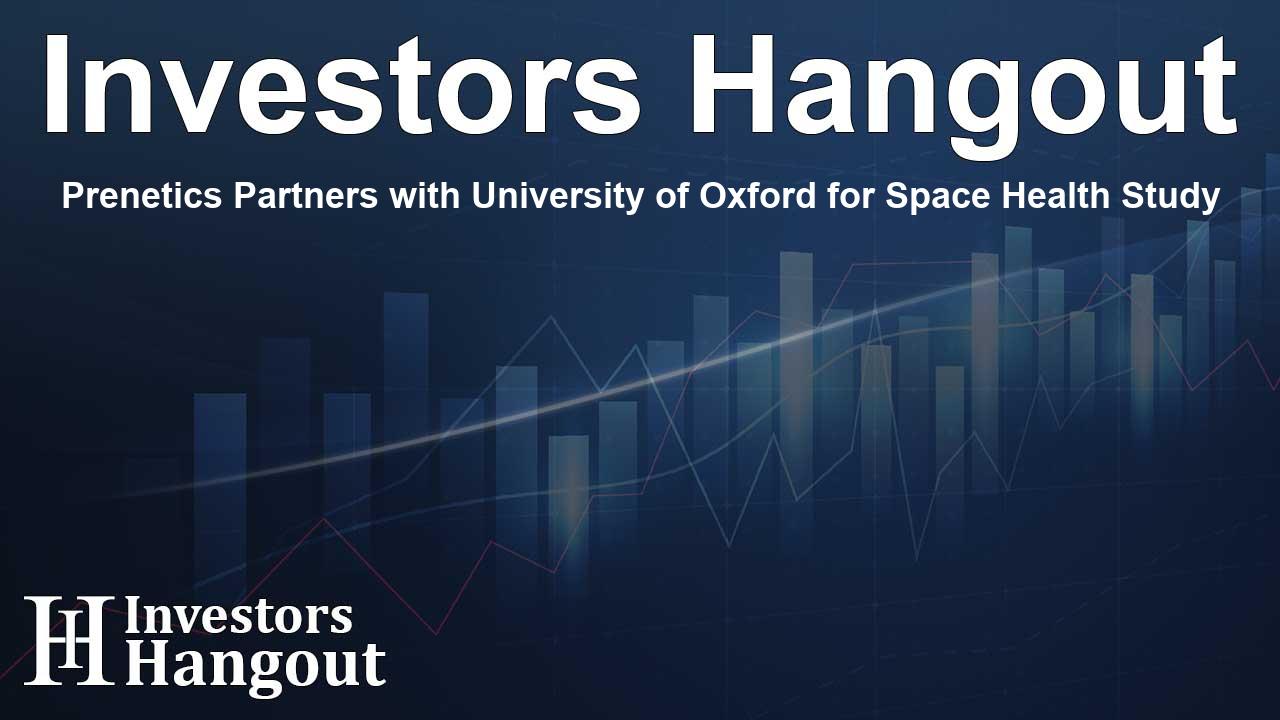Prenetics Partners with University of Oxford for Space Health Study

Prenetics and University of Oxford Launch Groundbreaking Space Experiment
Prenetics’ IM8 has embarked on an exciting journey in collaboration with the University of Oxford, focusing on accelerated aging and longevity aboard the International Space Station (ISS). This mission, underpinned by Space Applications Services and Metavisionaries, commenced recently following a successful launch via SpaceX CRS-31.
The Mission's Objectives and Importance
This innovative month-long experiment is not merely a scientific endeavor; it is a step forward in understanding human health both in space and on Earth. By leveraging the unique environment of microgravity, researchers hope to delve deeper into the mechanisms of aging, using space's distinctive characteristics to study cellular processes accelerated by the absence of gravity. This dual approach aims to enhance healthspan for individuals on the ground while also improving astronaut well-being during missions.
A Unique Platform for Research
Launched on November 4th, organizing this study onboard the ISS presents a once-in-a-lifetime opportunity. Microgravity can facilitate cellular degeneration, oxidative stress, and DNA damage, mimicking aging processes at an accelerated rate. Dr. Jim Green, a prominent figure in the scientific community and former Chief Scientist of NASA, asserts that the exploration of these topics has historically led to medical breakthroughs that benefit humanity at large.
The Focus on Autophagy and Aging
The crux of this groundbreaking project is autophagy, a naturing biological process in which cells recycle damaged components. With aging, autophagy diminishes, leading to health concerns ranging from decreased immune responses to chronic inflammation. By investigating this process in a microgravity setting, researchers hope to unlock new strategies for enhancing cellular health.
Enhancing Healthspan: What it Means for Your Future
The mission's investment in specially designed 3D organoids signifies a pioneering approach to health innovation. These miniature tissues represent human biology in an orbiting laboratory and aim to bridge the gap between space research and terrestrial health. Dr. Ghada Alsaleh from the University of Oxford articulates the transformative potential of microgravity, highlighting its ability to compress the study of aging into a shorter timeline, potentially revolutionizing our understanding of how to manage aging on Earth.
Real-Time Research and Global Impact
With the help of a science cube housing CRT8 ingredients, the research team will be able to monitor the experiment in real-time from Oxford. By utilizing platforms like the ICE Cubes Facility, researchers can ensure their findings are precise and actionable, paving the way for real-time discussions about health innovations. CEO Danny Yeung emphasizes how this collaboration marks an important leap toward advancing health science.
Potential Outcomes of the Research
This pioneering study has the potential to reshape IM8's future endeavors significantly:
- Enhanced Product Efficacy: Research findings could refine the development of their supplements, specifically in relation to how CRT8 influences autophagy, enhancing effectiveness.
- Innovation and New Products: Insights from this study may fuel the creation of new supplements that target particular aging pathways, reinforcing IM8's reputation as a leader in wellness innovation.
About Prenetics and Its Vision
Prenetics (NASDAQ:PRE) is a health sciences powerhouse committed to improving consumer and clinical health. The company’s comprehensive approach includes IM8, a health and wellness brand focused on delivering high-quality supplements, and Insighta, which emphasizes early cancer detection. Their commitment to enhancing life through science is further manifested in their partnership with esteemed organizations like the University of Oxford.
Frequently Asked Questions
What is the primary goal of the Prenetics and University of Oxford experiment?
The primary objective is to study accelerated aging and longevity in microgravity to uncover insights that can enhance health on Earth.
How does microgravity affect aging research?
Microgravity conditions can mimic aging processes, allowing researchers to study cellular changes more rapidly than on Earth.
What are the expected benefits of the research findings?
Findings may lead to improved healthspan on Earth and enhanced astronaut well-being during space missions.
What is autophagy, and why is it significant?
Autophagy is the process of recycling damaged cellular components, and its decline with age contributes to various health issues, making it crucial for longevity research.
How can the public access the products developed from this study?
Products may be made available through IM8's platform after the research translates to practical applications, enhancing overall health.
About The Author
Contact Lucas Young privately here. Or send an email with ATTN: Lucas Young as the subject to contact@investorshangout.com.
About Investors Hangout
Investors Hangout is a leading online stock forum for financial discussion and learning, offering a wide range of free tools and resources. It draws in traders of all levels, who exchange market knowledge, investigate trading tactics, and keep an eye on industry developments in real time. Featuring financial articles, stock message boards, quotes, charts, company profiles, and live news updates. Through cooperative learning and a wealth of informational resources, it helps users from novices creating their first portfolios to experts honing their techniques. Join Investors Hangout today: https://investorshangout.com/
The content of this article is based on factual, publicly available information and does not represent legal, financial, or investment advice. Investors Hangout does not offer financial advice, and the author is not a licensed financial advisor. Consult a qualified advisor before making any financial or investment decisions based on this article. This article should not be considered advice to purchase, sell, or hold any securities or other investments. If any of the material provided here is inaccurate, please contact us for corrections.
